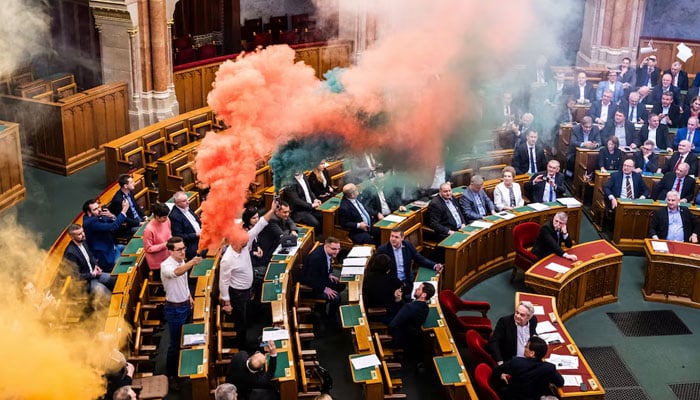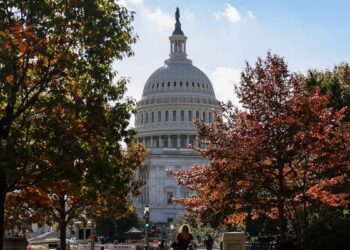Select Language:
Budapest Passes Controversial Pride March Ban Amid Protests
BUDAPEST: Hungary’s parliament has enacted a contentious new law banning the annual Budapest Pride march, provoking outrage and demonstrations across the country. Critics have accused Prime Minister Viktor Orban’s government of intensifying its assault on LGBTQ rights under the pretext of "protecting children."
In recent years, Orban’s administration has consistently disparaged LGBTQ individuals while systematically reversing their rights in the name of "child protection." The Prime Minister asserted on social media, “We will not allow woke ideology to jeopardize our children.”
On Tuesday evening, thousands of demonstrators gathered in central Budapest, chanting "We are not afraid!" to express their dissent against the legislative decision, which is yet another blow to LGBTQ rights globally. Protesters even obstructed access to a central bridge in the capital.
Laszlo Donat, a 40-year-old engineer, told AFP that he felt compelled to join the protest, stating, “We have had enough in Hungary,” and he called for the restoration of democracy by "replacing this corrupt, mafia-like system."
The law, proposed by Orban’s ruling Fidesz-KDNP coalition, prohibits the Pride march by claiming it violates Hungary’s controversial "child protection" legislation, and imposes penalties on those participating in the event.
The newly enacted measure declares that holding gatherings contrary to a 2021 law that bans the "promotion and display" of homosexuality to minors is forbidden. This law also modifies multiple regulations, including those related to assembly rights, now stipulating that only events that uphold children’s rights to appropriate physical, mental, and moral development may occur.
Organizers or attendees of a prohibited event could face fines up to 500 euros (approximately $540), and police are permitted to utilize facial recognition technology to identify violators.
The bill was fast-tracked through the 199-seat National Assembly, passing with 136 votes in favor, 27 against, and the remainder abstaining. Representatives from the right-wing Jobbik party and the far-right Our Homeland party also supported the measure.
Liberal opposition members disrupted the session by shouting, lighting flares, and playing the Soviet anthem in protest.
In his state of the nation address in February, Orban cautioned Pride organizers that preparing for this year’s event would be “a waste of money and time.” Last month, his administration stated that the Pride march would no longer be "tolerated" in the "same public form" as in previous years.
A Convenient Scapegoat?
Since his return to leadership in 2010, Orban has faced backlash for undermining democratic institutions and is accused of diminishing the rule of law. With support from allies such as former U.S. President Donald Trump, Orban’s government has escalated its rhetoric against dissenters and introduced a series of stringent legislative measures.
Just recently, Orban referred to his political adversaries, judges, the media, and NGOs as "stinky bugs" and pledged to "eliminate the entire shadow army." Later this month, parliament is expected to vote on constitutional amendments that would "temporarily strip" dual citizens of their Hungarian nationality if labeled security threats, as well as define that a person is "either a man or a woman."
Critics argue that Orban seeks to win over far-right voters with these recent actions, particularly as he faces a challenge from former ally turned rival Peter Magyar ahead of elections next year. Szabolcs Hegyi, a legal expert from the Hungarian Civil Liberties Union (TASZ), remarked that it is “sad” to see legislation that severely restricts civil liberties being exploited for “party interests” and warned about a potential slippery slope. He cautioned, “Ultimately, we could reach a point where only those who do not criticize the government can protest.”
Despite the opposition, march organizers remain defiant, pledging to proceed with the 30th Budapest Pride event on June 28. Spokesperson Mate Hegedus stated, “People are willing to come to Budapest Pride and show their support, even if it means paying fines.” He emphasized that the government’s attempts to scapegoat the LGBTQ community would not deter their determination.






